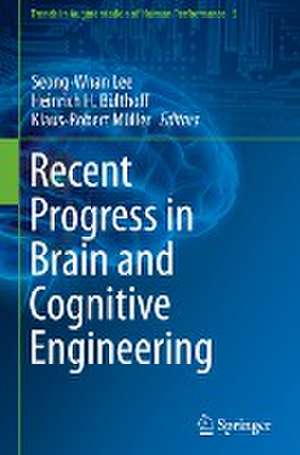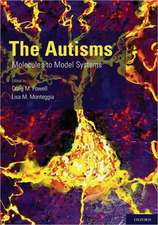Recent Progress in Brain and Cognitive Engineering: Trends in Augmentation of Human Performance, cartea 5
Editat de Seong-Whan Lee, Heinrich H. Bülthoff, Klaus-Robert Mülleren Limba Engleză Hardback – 5 noi 2015
Brain and Cognitive Engineering is a converging study field to derive a better understanding of cognitive information processing in the human brain, to develop “human-like” and neuromorphic artificial intelligent systems and to help predict and analyze brain-related diseases.
The key concept of Brain and Cognitive Engineering is to understand the Brain, to interface the Brain, and to engineer the Brain. It could help us to understand the structure and the key principles of high-order information processing on how the brain works, to develop interface technologies between a brain and external devices and to develop artificial systems that can ultimately mimic human brain functions. The convergence of behavioral, neuroscience and engineering research could lead us to advance health informatics and personal learning, to enhance virtual reality and healthcare systems, and to “reverse engineer” some brain functions and build cognitive robots.
In this book, four different recent research directions are presented: Non-invasive Brain-Computer Interfaces, Cognitive- and Neural-rehabilitation Engineering, Big Data Neurocomputing, Early Diagnosis and Prediction of Neural Diseases. We cover numerous topics ranging from smart vehicles and online EEG analysis, neuroimaging for Brain-Computer Interfaces, memory implantation and rehabilitation, big data computing in cultural aspects and cybernetics to brain disorder detection. Hopefully this will provide a valuable reference for researchers in medicine, biomedical engineering, in industry and academia for their further investigations and be inspiring to those who seek the foundations to improve techniques and understanding of the Brain and Cognitive Engineering
research field.
| Toate formatele și edițiile | Preț | Express |
|---|---|---|
| Paperback (1) | 637.13 lei 6-8 săpt. | |
| SPRINGER NETHERLANDS – 23 aug 2016 | 637.13 lei 6-8 săpt. | |
| Hardback (1) | 646.30 lei 3-5 săpt. | |
| SPRINGER NETHERLANDS – 5 noi 2015 | 646.30 lei 3-5 săpt. |
Preț: 646.30 lei
Preț vechi: 760.35 lei
-15% Nou
Puncte Express: 969
Preț estimativ în valută:
123.67€ • 129.12$ • 102.35£
123.67€ • 129.12$ • 102.35£
Carte disponibilă
Livrare economică 15-29 martie
Preluare comenzi: 021 569.72.76
Specificații
ISBN-13: 9789401772389
ISBN-10: 940177238X
Pagini: 300
Ilustrații: XI, 213 p.
Dimensiuni: 155 x 235 x 20 mm
Greutate: 0.58 kg
Ediția:1st ed. 2015
Editura: SPRINGER NETHERLANDS
Colecția Springer
Seria Trends in Augmentation of Human Performance
Locul publicării:Dordrecht, Netherlands
ISBN-10: 940177238X
Pagini: 300
Ilustrații: XI, 213 p.
Dimensiuni: 155 x 235 x 20 mm
Greutate: 0.58 kg
Ediția:1st ed. 2015
Editura: SPRINGER NETHERLANDS
Colecția Springer
Seria Trends in Augmentation of Human Performance
Locul publicării:Dordrecht, Netherlands
Public țintă
ResearchCuprins
Part I. Non-invasive Brain-Computer Interface.- Chapter 1. Future directions for brain-machine interfacing technology.- Chapter 2. Brain-Computer Interface for Smart Vehicle: Detection of Braking Intention during Simulated Driving.- Chapter 3. Benefits and limits of multimodal neuroimaging for Brain Computer Interfaces.- Chapter 4. Multifrequency Analysis of Brain-Computer Interfaces.- Part II. Cognitive- and Neural-rehabilitation Engineering.- Chapter 5. Current Trends in Memory Implantation and Rehabilitation.- Chapter 6. Moving Brain Controlled Devices Outside the Lab: Principles and Applications.- Part III. Big Data Neurocomputing.- Chapter 7. Across cultures: a Cognitive and Computational Analysis of Emotional and Conversational Facial Expressions in Germany and Korea.- Chapter 8. Bottom-Up Processing in Complex Scenes: a unifying perspective on segmentation, fixation saliency, candidate regions, base-detail decomposition, and image enhancement.- Chapter 9. Perception-based motioncueing: a Cybernetics approach to motion simulation.- Chapter 10. The other-race effect revisited: no effect for faces varying in race only.- Part IV. Early Diagnosis and Prediction of Neural Diseases.- Chapter 11. Functional neuromonitoring in acquired head injury.- Chapter 12. Diagnostic Optical Imaging Technology and its Principles.- Chapter 13. Detection of Brain Metastases using Magnetic Resonance Imaging.- Chapter 14. Deep Learning in Diagnosis of Brain Disorders.
Recenzii
“Fourteen chapters provide examples of cutting-edge research in understanding high-order information processing by the brain and how the brain may create artificial systems that interact with the real world. Advanced researchers will find helpful directions in these studies. … Each standalone chapter has an abstract at the beginning and list of references at the end.” (Brad Reid, Computing Reviews, March, 2016)
Textul de pe ultima copertă
Brain and Cognitive Engineering is a converging study field to derive a better understanding of cognitive information processing in the human brain, to develop “human-like” and neuromorphic artificial intelligent systems and to help predict and analyze brain-related diseases.
The key concept of Brain and Cognitive Engineering is to understand the Brain, to interface the Brain, and to engineer the Brain. It could help us to understand the structure and the key principles of high-order information processing on how the brain works, to develop interface technologies between a brain and external devices and to develop artificial systems that can ultimately mimic human brain functions. The convergence of behavioral, neuroscience and engineering research could lead us to advance health informatics and personal learning, to enhance virtual reality and healthcare systems, and to “reverse engineer” some brain functions and build cognitive robots.
In this book, four different recent research directions are presented: Non-invasive Brain-Computer Interfaces, Cognitive- and Neural-rehabilitation Engineering, Big Data Neurocomputing, Early Diagnosis and Prediction of Neural Diseases. We cover numerous topics ranging from smart vehicles and online EEG analysis, neuroimaging for Brain-Computer Interfaces, memory implantation and rehabilitation, big data computing in cultural aspects and cybernetics to brain disorder detection. Hopefully this will provide a valuable reference for researchers in medicine, biomedical engineering, in industry and academia for their further investigations and be inspiring to those who seek the foundations to improve techniques and understanding of the Brain and Cognitive Engineering research field.
The key concept of Brain and Cognitive Engineering is to understand the Brain, to interface the Brain, and to engineer the Brain. It could help us to understand the structure and the key principles of high-order information processing on how the brain works, to develop interface technologies between a brain and external devices and to develop artificial systems that can ultimately mimic human brain functions. The convergence of behavioral, neuroscience and engineering research could lead us to advance health informatics and personal learning, to enhance virtual reality and healthcare systems, and to “reverse engineer” some brain functions and build cognitive robots.
In this book, four different recent research directions are presented: Non-invasive Brain-Computer Interfaces, Cognitive- and Neural-rehabilitation Engineering, Big Data Neurocomputing, Early Diagnosis and Prediction of Neural Diseases. We cover numerous topics ranging from smart vehicles and online EEG analysis, neuroimaging for Brain-Computer Interfaces, memory implantation and rehabilitation, big data computing in cultural aspects and cybernetics to brain disorder detection. Hopefully this will provide a valuable reference for researchers in medicine, biomedical engineering, in industry and academia for their further investigations and be inspiring to those who seek the foundations to improve techniques and understanding of the Brain and Cognitive Engineering research field.
Caracteristici
Describes up-to-date discussions in Brain and Cognitive Engineering Considers aspects on how the brain may implement in artificial systems that can interact intelligently with the real world Provides valuable resources and introductory materials to researchers and students in this field
















